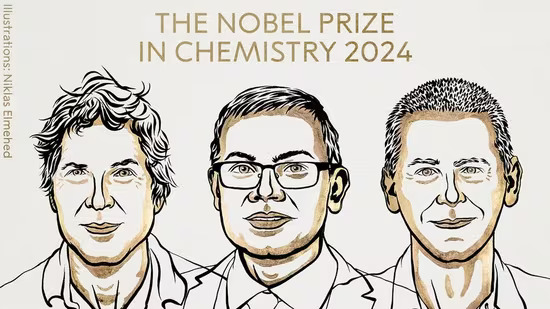The article published in the editorial section of The Hindu Newspaper talks about The Nobel Prize in Chemistry has been awarded to three scientists: David Baker, Demis Hassabis, and John M. Jumper. Their work has made a big difference in how we understand proteins, which are important molecules in our bodies.
David Baker is recognized for creating new proteins that never existed before. On the other hand, Demis Hassabis and John M. Jumper developed a special computer program called AlphaFold. This program helps scientists predict the shapes of proteins, which has been a tough problem for many years.
Proteins are made up of long chains of small units called amino acids. There are 20 different amino acids that can be combined in many ways. The way a protein folds into a specific shape is very important because that shape determines what the protein does in the body. For a long time, figuring out the 3D shape of a protein was very difficult and took a lot of time. Many proteins’ shapes were only partly known.
With AlphaFold, predicting protein shapes has become much easier. In 2018, the program was about 60% accurate, and by 2020, it was as accurate as the traditional methods, like X-ray crystallography, that scientists had been using for many years. AlphaFold can now predict the shapes of nearly all 200 million proteins found in different species, making it simpler for scientists to study their functions.
David Baker’s contribution is also significant. He uses a program called Rosetta to create new proteins from scratch. Instead of just figuring out the shapes of known proteins, he designs proteins and finds the right amino acid sequences to make them. Baker made Rosetta available for free, so other scientists could use it to do their own research and create new proteins.
Overall, the work of these scientists is changing how we study proteins. Their tools, AlphaFold and Rosetta, are used by millions of researchers around the world. This progress helps us understand biology better and could lead to new treatments and technologies in medicine.
.
.
.
.join our telegram channel for regular updates of The Hindu Epaper Editorial Explanation-https://t.me/Thehindueditorialexplanation
The Hindu Epaper Editorial Explanation given by Hello Student is only a supplementary reading to the original article to make things easier for the students.
In conclusion, preparing for exams in India can be a daunting task, but with the right strategies and resources, success is within reach. Remember, consistent study habits, effective time management, and a positive mindset are key to overcoming any academic challenge. Utilize the tips and techniques shared in this post to enhance your preparation and boost your confidence. Stay focused, stay motivated, and don’t forget to take care of your well-being. With dedication and perseverance, you can achieve your academic goals and pave the way for a bright future. Good luck!
The Editorial Page of The Hindu is an essential reading for all the students aspiring for UPSC, SSC, PCS, Judiciary etc or any other competitive government exams.
This may also be useful for exams like CUET UG and CUET PG, GATE, GMAT, GRE AND CAT
To read this article in Hindi –https://bhaarat.hellostudent.co.in/

